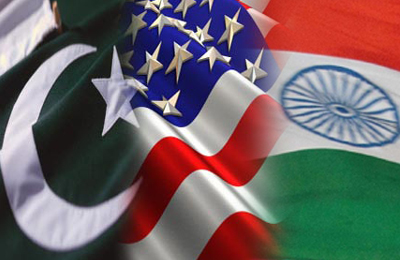U.S. Gambles on New Delhi in Indo-Pakistani Proxy War
 Michael Hughes
Michael Hughes
August 15, 2016
The United States is pivoting towards New Delhi at the expense of Islamabad vis-à-vis the rivals’ proxy war inside Afghanistan. One could argue that given Pakistan is unlikely to ever abandon terrorism as a foreign policy tool, the U.S. and India might as well collaborate on containment. Yet Pakistan, seeing Indian influence in Kabul as nothing less than an existential threat, will probably intensify support for jihadists in pursuit of “strategic depth.” However, the biggest wildcard in the game right now is China, which may be willing to bolster Pakistan to counter New Delhi, a possibility the U.S. should consider as it rolls the dice.
During an August 10 meeting with Indian security officials, according to The Times of India (TOI), General John Nicholson asked New Delhi to increase military assistance to Kabul in addition to training Afghan troops. This comes shortly after the Pentagon suspended $300 million in aid to Pakistan for failing to root out the Haqqani Network. TOI journalist Indrani Bagchi made an incisive observation about America’s new approach to India.
“This is a very different response from the time when the U.S. used to discourage India from getting into the security sector keeping Pakistani sensitivities in mind,” Bagchi wrote.
Former US congressional General Counsel Charles Tiefer believes that every aspect of these recent moves cries “proxy war” – including India supplying Afghanistan with helicopters for counterterrorism missions inside Pakistan, all of which the foundation was laid for by meetings at the highest levels between U.S. and Indian political leaders.
“It went almost unnoticed that this followed [Indian] Prime Minister [Narendra] Modi and President [Barack] Obama agreeing not so long ago that the two nations should move against terrorist groups, especially the ones based or helped by the Pakistani ISI [Inter-Services Intelligence],” Tiefer said.
The new announcement by Nicholson, he continued, was explicitly directed not only at the Haqqani Network and ISIS, but other terrorist entities based in Pakistan as well, including Lashkar-e-Taiba (LeT), the group responsible for the 2008 Mumbai attacks.
Islamabad, for its part, has been leveling the same charges against New Delhi. For example, Pakistani authorities claim Indian-backed militants groomed inside Afghanistan are responsible for the August 9 attack on a hospital in Quetta that killed more than 70 people.
The day after the tragedy, according to Dawn.com, Pakistan’s Army Chief, General Raheel Sharif, said the attack was “managed by Indian intelligence agencies” from Afghan soil to target the China-Pakistan Economic Corridor, a bundle of development projects worth nearly $50 billion intended to boost Pakistan’s economy, energy industry and infrastructure.
In the wake of the attack, Chinese Premier Li Keqiang told Prime Minister Nawaz Sharif that Beijing was ready to strengthen cooperation with Pakistan to fight terrorism. The content and timing of the statement was remarkable in the context of increasing tensions between India and China. Amy Kazmin of The Financial Times reported that over the weekend Chinese foreign minister Wang Yi visited India at a “critical juncture,” albeit the trip was likely a cosmetic feint for mass consumption rather than actual diplomatic outreach.
“In public, India and China have professed friendship and desire for stronger economic ties,” Kazmin noted. “But friction over geopolitics – and each country’s web of strategic relationships – have been rising sharply.”
New Delhi was especially vexed by recent “unprecedented” joint military operations conducted by Chinese and Pakistani troops in Kashmir. China, meanwhile, was not delighted by India’s public support for an international tribunal’s ruling against Beijing’s claims in the South China Sea.
Pakistan is no doubt rattled by America’s pivot. From the outset, Pakistan’s generals have been wary of the rise of the Hindu nationalist Modi. Overall, Pakistan’s fears are grounded in a certain strategic logic. Consider that India dwarfs Pakistan by nearly every measure of national power available. India’s population, economy and military budget are about eight times the size of Pakistan’s. Not to mention, Pakistan has lost three conventional wars to its giant neighbor.
T.V. Paul writes in The Warrior State that Pakistani “hyper-realpolitik” prioritizes security interests “as an end in itself and above all other national goals, including economic welfare, irrespective of the consequences.” So one could imagine how they feel about a U.S.-Indian alliance.
Not only unnerved by Washington’s partnership with India, Pakistan has also taken issue with disparaging remarks about the country’s anti-terror efforts. A senior official from Pakistan’s Ministry of Foreign Affairs recently warned that U.S. comments could prove counterproductive.
“They [the Americans] have been told that such statements or policy of discrimination will hamper the global war on terror and increase pressure on the government from the people of Pakistan to leave the U.S.-led alliance,” the official stated.
In essence, we have a proxy war within a proxy war on our hands, with China and Pakistan using the Taliban against Afghan forces who are backed by a budding U.S-Indian alliance. A geostrategic chess match for the ages that will, unfortunately, lead to much bloodshed – most of which will be spilt across the fields, mountains, valleys, and towns of Afghanistan.
